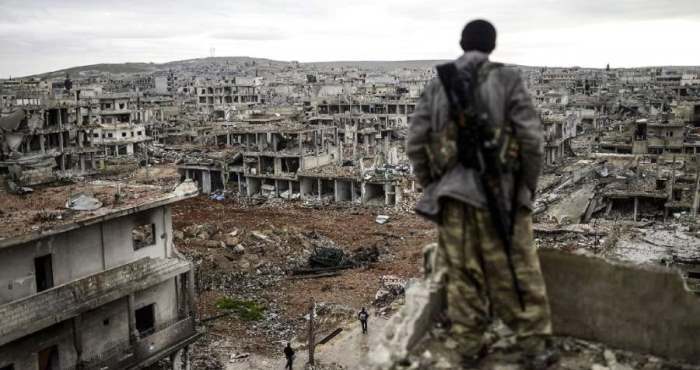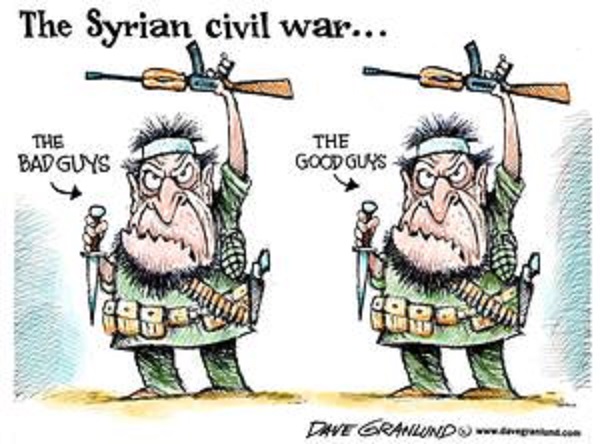MUNICH, Feb 12 (Reuters) - Major powers agreed on Friday to implement a cessation of hostilities in Syria and to expand delivery of humanitarian aid to people caught up in the conflict, officials said. U.S. Secretary of State John Kerry, speaking to reporters after a meeting in Munich that included Russia and more than a dozen other countries, said the target for implementing the nationwide cessation of fighting was a week’s time…. He said the cessation would not apply to Islamic State and other militant groups fighting in Syria. British Foreign Secretary Philip Hammond said ending fighting could only succeed if Russia stopped air strikes supporting Syrian government forces’ advance against the opposition…. “If implemented fully and properly … this (deal) will be an important step towards relieving the killing and suffering in Syria,” Hammond said in a statement.
 After five years of civil war, somewhere in the neighborhood of 250,000 dead (The official UN estimate, likely absurdly low), millions of refugees fleeing, and the rise of ISIS/ISIL, there may now be a chance for something resembling peace. Five years of unrelenting conflict later, to finally have some good news, to have any hope at all that the suffering and inhumanity might be ending is a welcome change. Realistically, no one familiar with Russia and the Syrian government should be holding their breath, but that both sides are talking about a cease-fire is progress.
After five years of civil war, somewhere in the neighborhood of 250,000 dead (The official UN estimate, likely absurdly low), millions of refugees fleeing, and the rise of ISIS/ISIL, there may now be a chance for something resembling peace. Five years of unrelenting conflict later, to finally have some good news, to have any hope at all that the suffering and inhumanity might be ending is a welcome change. Realistically, no one familiar with Russia and the Syrian government should be holding their breath, but that both sides are talking about a cease-fire is progress.
Cautious optimism (VERY cautious) may well be the order of the day; no one should be assuming the role of Neville Chamberlain and proclaiming this agreement means “peace in our time.” Still, while the definition of “peace” isn’t “the absence of war,” any cessation of hostilities is welcome news. With the cynically self-interested Russians and the Syrian government involved, there’s no telling if they’ll be true to their commitments…or whether they’ll abandon them as soon as they conflict with their perceived best interests.
I was fortunate to have traveled around Syria prior to the civil war, and I love the country and its people. OK, so it’s not exactly renowned for freedom, openness, and tolerance of dissent, but I found the people to be friendly, the history and architecture fascinating, and the food unique and excellent. That was then; now I suspect it’s very unlikely I’d recognize the place. Places like Homs, which has been thoroughly destroyed by five years of war, look nothing like the vibrant, busy cities I experienced. Starvation, suffering, and disease have long since replaced the positives aspects of Syria I experienced during my time there.
Aleppo, one of my favorite places- and the largest city in Syria- is barely recognizable. I can remember standing on the ramparts of the citadel above the city and being able to see for miles as Aleppo spread out before me in all directions. I have a feeling about all I’d see now would be destruction and rubble as far as the eye could see.
A staggering 11.5 percent of Syrians have been killed or wounded since the civil war began in 2011, according to a new report. That’s more than the populations of 15 U.S. states — New Mexico, Nebraska, West Virginia, Idaho, Hawaii, Maine, New Hampshire, Rhode Island, Montana, Delaware, South Dakota, North Dakota, Alaska, Vermont and Wyoming.
The number of fatalities in Syria added up to 470,000 at the end of 2015, according to the nonprofit advocacy group the Syrian Center for Policy Research’s new report titled “Confronting Fragmentation.” United Nations estimates have placed the number of people killed at 250,000, but the SCPR said that this figure is grossly inaccurate, given that the U.N. stopped collecting data in 2014.
This represents a mortality rate increase from 4.4 per thousand in 2010 to 10.9 per thousand in 2015, the study said.
The “human catastrophe” in Syria is also reflected in the amount of people wounded, which has climbed to 1.88 million according to the report. Life expectancy at birth has plummeted from 70.5 years in 2010 to 55.4 years in 2015.
Estimates have as many as 6.23 MILLION people internally displaced and a total of 4.17 million have either fled Syria (three million) or migrated (1.17 million) to other countries. This is in a country whose population in July 2014 was estimated to be just a shade over 17 million.
To call what’s happened in Syria to be a humanitarian crisis of epic proportions doesn’t begin to do justice to the monstrosity visited upon Syria by the government, anti-government rebels, and ISIS/ISIL. The government has been particularly callous and cruel to their own people (employing chemical weapons, for instance), but all parties bear responsibility for the bloodshed and carnage.
Syria represents an almost incomprehensible “human catastrophe.” The government of Bashar al-Assad, primarily concerned with self-preservation, has visited unimaginable death and destruction upon its own people. ISIS/ISIL has demonstrated a predilection for humanity in the name of their bastardized version of Islam. Syrian rebels, while trying to reclaim their country, have on occasion succumbed to the temptation to engage in excess and brutality.
Russia has proposed the implementation of a cease-fire next month…but even if all parties agree and the cease-fire holds, what of Syria? How can a country not blessed with extensive material wealth (i.e.- oil) hope to put itself back together? How can a Third World country like Syria hope to rebuild itself when much of the country’s infrastructure has been reduced to rubble?
My fear is that Syria, a country I love, will remain a post-apocalyptic hellscape…because rebuilding it will prove an overwhelming task of Brobdingnagian proportions. Putting Humpty Dumpty back together again will require resources Syria doesn’t have and the international community will be reluctant to provide absent guarantees of stability. With roughly a quarter of the population having left the country, what will become of those who’ve been unable to escape?
Right now, Syria appears to be the greatest challenge facing the international community, and I fear that compassion fatigue may well set in before the work of rebuilding the country is anywhere near complete. The post-apocalyptic hellscape that is Syria today may well become its new normal, which will stand as mute testimony to the international community’s abject failure.
Syrian civilians deserve better…but there very well may not be a future for them in their homeland. Syria, a nation with a long and proud history, appears as if it might end up consigned to our collective memory and the works of Middle East historians. I find myself mourning a country I love, even as I recognize and understand that it will almost certainly never exist in the same way again.

